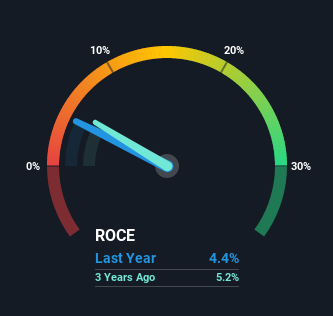- United States
- /
- Other Utilities
- /
- NYSE:ED
Consolidated Edison (NYSE:ED) Will Want To Turn Around Its Return Trends

If you're not sure where to start when looking for the next multi-bagger, there are a few key trends you should keep an eye out for. Typically, we'll want to notice a trend of growing return on capital employed (ROCE) and alongside that, an expanding base of capital employed. This shows us that it's a compounding machine, able to continually reinvest its earnings back into the business and generate higher returns. However, after briefly looking over the numbers, we don't think Consolidated Edison (NYSE:ED) has the makings of a multi-bagger going forward, but let's have a look at why that may be.
Understanding Return On Capital Employed (ROCE)
For those who don't know, ROCE is a measure of a company's yearly pre-tax profit (its return), relative to the capital employed in the business. Analysts use this formula to calculate it for Consolidated Edison:
Return on Capital Employed = Earnings Before Interest and Tax (EBIT) ÷ (Total Assets - Current Liabilities)
0.044 = US$2.5b ÷ (US$63b - US$5.3b) (Based on the trailing twelve months to September 2021).
Therefore, Consolidated Edison has an ROCE of 4.4%. On its own, that's a low figure but it's around the 4.8% average generated by the Integrated Utilities industry.
View our latest analysis for Consolidated Edison

Above you can see how the current ROCE for Consolidated Edison compares to its prior returns on capital, but there's only so much you can tell from the past. If you'd like to see what analysts are forecasting going forward, you should check out our free report for Consolidated Edison.
What Can We Tell From Consolidated Edison's ROCE Trend?
On the surface, the trend of ROCE at Consolidated Edison doesn't inspire confidence. Over the last five years, returns on capital have decreased to 4.4% from 5.5% five years ago. Meanwhile, the business is utilizing more capital but this hasn't moved the needle much in terms of sales in the past 12 months, so this could reflect longer term investments. It may take some time before the company starts to see any change in earnings from these investments.
The Key Takeaway
To conclude, we've found that Consolidated Edison is reinvesting in the business, but returns have been falling. And investors may be recognizing these trends since the stock has only returned a total of 32% to shareholders over the last five years. As a result, if you're hunting for a multi-bagger, we think you'd have more luck elsewhere.
Since virtually every company faces some risks, it's worth knowing what they are, and we've spotted 4 warning signs for Consolidated Edison (of which 1 is potentially serious!) that you should know about.
While Consolidated Edison isn't earning the highest return, check out this free list of companies that are earning high returns on equity with solid balance sheets.
New: AI Stock Screener & Alerts
Our new AI Stock Screener scans the market every day to uncover opportunities.
• Dividend Powerhouses (3%+ Yield)
• Undervalued Small Caps with Insider Buying
• High growth Tech and AI Companies
Or build your own from over 50 metrics.
This article by Simply Wall St is general in nature. We provide commentary based on historical data and analyst forecasts only using an unbiased methodology and our articles are not intended to be financial advice. It does not constitute a recommendation to buy or sell any stock, and does not take account of your objectives, or your financial situation. We aim to bring you long-term focused analysis driven by fundamental data. Note that our analysis may not factor in the latest price-sensitive company announcements or qualitative material. Simply Wall St has no position in any stocks mentioned.
Have feedback on this article? Concerned about the content? Get in touch with us directly. Alternatively, email editorial-team (at) simplywallst.com.
About NYSE:ED
Consolidated Edison
Through its subsidiaries, engages in the regulated electric, gas, and steam delivery businesses in the United States.
Average dividend payer with questionable track record.
Similar Companies
Market Insights
Community Narratives



